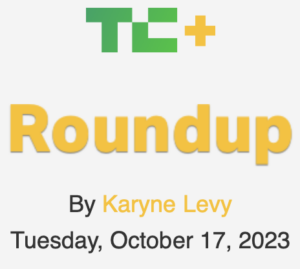
A New Paid Opp at Enterprise Times
UK-based Enterprise Times has an interesting proposition this year for B2B agency folks: instead of pitching weak news and hoping for the best, why not pay for prominent publication at an affordable rate?

UK-based Enterprise Times has an interesting proposition this year for B2B agency folks: instead of pitching weak news and hoping for the best, why not pay for prominent publication at an affordable rate?

Tech media changed today with the merger of TechTarget and Informa PLC, which calls itself “a leading international events, digital services and academic knowledge group.”

We’ve probably overcovered Fortune this year relative to other publications, but only because the 94-year-old publication outperformed everyone else in the industry. That was then. Fortune may struggle in ’24 to replicate 2023’s success. Here’s why.

You need to be logged in to view this content. Please Log In. Not a Member? Join Us

Ten years ago last month, we published a list of narrative story formulas that often showed up in Tier 1 publications. Our research back then determined that a small number of edit formulas provided structure for a large number of pitchable, high share-of-voice feature stories.

TechCrunch last week fielded a reader survey built to define what TC readers see in 2024, and perhaps, how many editors produce it.

Ever go to Techmeme and wonder which article is “the best” on a given topic? Generative AI can help answer that question. We looked at news published this week from ZDNet, TechCrunch and The Verge…

What will become of contributed content at TechCrunch now that gatekeeper Walter Thompson has left the publication? Subscribers are asking.

Few publications in the 21st century have grown the way Fortune has. How can this growth work for you, not against you? That’s the mission of this SWMS deep-dive.
We heard recently that Forbes has asked its contributors to be clearer about their conflicts of interest, if any. We inquired with Forbes PR about this and did not hear back. In any case, we went ahead and studied Forbes contributor disclosures in the AI space.
YOUR ACCOUNT
FRIDGE NOTES
Former NYT reporter and Google Cloud EIC Quentin Hardy also interviewed Eric Savitz about his career and move to GM. Good reading.
The UK-based newsletter company called Trending Now uses AI to scrape what’s trending across 27 areas of B2B. Press Gazette has additional detail. The company employs ten, none of whom are journalists (by traditional definition).
The full union membership needs to ratify it on July 24, but it looks like no editors can be laid off or suffer a salary cut if the publication goes big in its use of generative AI. More detail here from Neiman.
Goldman Sachs took 32 pages to say pretty much that. The media business may turn out to be an outlier, an industry perfectly suited to synthetic, multilingual words, sounds and images at scale. As for everyone else, well, the global consultancies will learn the truth first because they have rushed to monetize Gen AI — they aren’t yet succeeding.
Three free one-month subs are available from SWMS, no catches or gimmicks. Get in touch for details. BT is among the best tech newsletters out there.